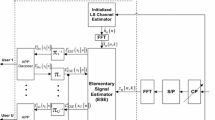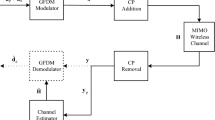Abstract
A BEM-based low-complexity channel estimation algorithm with analytical solution is proposed over rapidly time-varying channels for multiple-input multiple-output (MIMO) orthogonal frequency division multiplexing (OFDM) systems. The time-varying channel taps are estimated with the aid of the designed clustered frequency-multiplexed pilots across different antennas along with basis expansion model (BEM). The proposed approach is specifically designed for MIMO OFDM systems over doubly selective channels. For each subchannel, the derived BEM coefficients can be expressed by explicit analytical solution, whose calculations are partitioned into two steps. During the two steps, two different basis functions such as the critically sampled complex exponential (CCE)-BEM and P-BEM are adopted, respectively. For a MIMO system with \(N_T\) transmit antennas, \(N_R\) receive antennas and \(L\) channel taps, the complexity order of the proposed channel estimation is \(O(N_T N_R L\log L)\), whereas the complexity order of least squares (LS) estimation is \(O((N_T N_R L)^3)\). Additionally, the proposed channel estimation can be iteratively improved in conjunction with hybrid interference cancelation, with only requiring one iteration. Simulation results corroborate the performance advantages of the proposed solution over CCE-BEM based LS scheme under different normalized Doppler spreads.







Similar content being viewed by others
References
Tang, Z., Cannizzaro, R. C., Leus, G., & Banelli, P. (2007). Pilot-assisted time-varying channel estimation for OFDM systems. IEEE Transactions on Signal Processing, 55(5), 2226–2238.
Rugini, L., Banelli, P., & Leus, G. (2006). Low-complexity banded equalizers for OFDM systems in Doppler spread channels. EURASIP Journal on Applied Signal Processing, 19(1), 1–13.
Wang, Y., Chen, Q., Hou, X., & Zhang, Z., et al. (2013). Symmetric extension method for basis expansion models under fast-varying channels. Electronics Letters, 49(4), 305–307.
Hrycak, T., Das, S., Matz, G., & Feichtinger, H. (2011). Practical estimation of rapidly varying channels for OFDM systems. IEEE Transactions on Communications, 59(11), 3040–3048.
Yang, H., Xiong, J., Li, S., & Gui, L. (2013). Wavelet BEM based channel estimation over rapidly time-varying channels. In IEEE wireless communications and networking conference (WCNC), Shanghai, China.
Carrasco-Alvarez, R., Parra-Michel, R., Orozco-Lugo, A. G., & Tugnait, J. K. (2012). Time-varying channel estimation using two-dimensional channel orthogonalization and superimposed training. IEEE Transactions on Signal Processing, 60(8), 4439–4443.
Pena-Campos, F., Carrasco-Alvarez, R., Longoria-Gandara, O., & Parra-Michel, R. (2013). Estimation of fast time-varying channels in OFDM systems using two-dimensional prolate. IEEE Transactions on Wireless Communications, 12(2), 898–907.
Tang, Zijian, & Leus, Geert. (2011). Identifying time-varying channels with aid of pilots for MIMO-OFDM. EURASIP Journal on Advances in Signal Processing, 74(1), 1–19.
Ma, X., Giannakis, G., & Ohno, S. (2003). Optimal training for block transmissions over doubly selective wireless fading channels. IEEE Transactions on Signal Processing, 51(5), 1351–1366.
Barhumi, I., Leus, G., & Moonen, M. (2003). Optimal training design for MIMO OFDM systems in mobile wireless channels. IEEE Transactions on Signal Processing, 51(6), 1615–1624.
Minn, H., & Al-Dhahir, N. (2006). Optimal training signals for MIMO OFDM channel estimation. IEEE Transactions on Wireless Communications, 5(5), 1158–1168.
Jun-Han, Oh, Kim, Jin-Goog, & Lim, Jong-Tae. (2011). On the design of pilot symbols for OFDM systems over doubly-selective channels. IEEE Communications Letters, 15(12), 1335–1337.
Dai, X. (2007). Optimal training design for linearly time-varying MIMO/OFDM channels modelled by a complex exponential basis expansion. IET Communications, 1(5), 945–953.
Borah, D. K., & Hart, B. T. (1999). Frequency-selective fading channel estimation with a polynomial time-varying channel model. IEEE Transactions on Communications, 47(6), 862–873.
Hrycak, Tomasz, Das, Saptarshi, Matz, Gerald, & Feichtinger, Hans G. (2010). Low complexity equalization for doubly selective channels modeled by a basis expansion. IEEE Transactions on Signal Processing, 58(11), 5706–5719.
Tauböck, G., Hampejs, M., Svac, P., Matz, G., Hlawatsch, F., & Gröchenig, K. (2011). Low-complexity ICI/ISI equalization in doubly dispersive multicarrier systems using a decision-feedback LSQR algorithm. IEEE Transactions on Signal Processing, 59(5), 2432–2436.
Zheng, Y. R., & Xiao, C. (2003). Simulation models with correct statistical properties for Rayleigh fading channels. IEEE Transactions on Communications, 51(6), 920–928.
Gradshteyn, I. S., & Ryzhik, I. M. (2007). Table of Integrals, Series, and Products (7th ed.). New York: Academic Press.
Li, S., Xiong, J., Cheng, P., Gui, L., & Xu, Y. (2013). Low-complexity ICI Cancellation based on BEM for OFDM systems over doubly selective channels. IEICE Transactions on Communications, E96-B(06), 1588–1596.
Acknowledgments
This work was supported by Doctoral Scientific Research Foundation of Taiyuan University of Science and Technology (No. 20142005), NSFC (No. 61272262), New Century Excellent Talents in University (NCET-12-1037), Shanxi Province Programs for Science and Technology Development (No. 20120322005-01).
Author information
Authors and Affiliations
Corresponding author
Rights and permissions
About this article
Cite this article
Li, S., Sun, Z., Wang, A. et al. BEM-Based Low-Complexity Analytical Channel Estimation with Optional Iterative Interference Cancellation Over Rapidly Time-Varying Channels for MIMO OFDM Systems. Wireless Pers Commun 84, 15–35 (2015). https://doi.org/10.1007/s11277-015-2591-z
Published:
Issue Date:
DOI: https://doi.org/10.1007/s11277-015-2591-z




